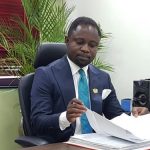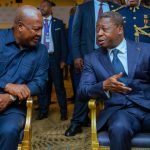The United States Embassy has introduced a new layer of scrutiny for student visa applicants, requiring them to make their social media profiles public before attending visa interviews.
This enhanced vetting policy, officials say, is aimed at gaining a more comprehensive understanding of applicants and safeguarding the integrity of the visa process.
Speaking in an interview with Joy News, Elliot Fertik, the Consul General at the US Embassy in Ghana, explained that while social media screening has always been a tool available to the Embassy, the new policy formalises and intensifies its use, particularly for student applicants.
“We reserve the right to engage in social media vetting for any visa applicant; however, under the current administration, we are focusing in particular on social media vetting for students,” he stated.
According to Mr. Fertik, the move is not intended to target the average applicant but rather to provide a fuller picture of each individual’s background.
“Whenever we consider a person’s eligibility for a visa, we look at the entire picture,” he explained.
“We look at what they present to us, but we also look online, and sometimes there’s information there that is important for our decision.”
He stressed that the measures are not aimed at the majority of Ghanaians, but at a small number of individuals whose conduct or background may render them ineligible.
When asked whether past online comments critical of the United States could negatively impact an applicant, Mr. Fertik acknowledged the possibility.
“It could,” he said, adding, “Every case is individual… the embassy considers the whole circumstances.”
However, he clarified that the initiative is not an attack on free speech but a practical measure to assess visa eligibility.
Mr. Fertik issued a stern caution to those who might overstay or violate the terms of their visas, highlighting severe repercussions.
“It could impact their future eligibility for a visa, it could incur a penalty of not being able to enter the United States for a certain period of time up to and including life,” he warned.
“They could even be subject to civil or criminal prosecution if they’ve engaged in criminal activity or fraud.”
He added that such actions could also undermine the chances of law-abiding Ghanaians who seek legitimate travel opportunities.
The Embassy also cautioned against relying on unofficial agents or “fixers” who promise expedited appointments or guaranteed visa approvals for a fee.
“They are lying; they are ripping you off,” Mr. Fertik said, citing numerous cases of applicants being defrauded of large sums of money.
He debunked claims that visas can be obtained without interviews or through backdoor channels, urging applicants to rely solely on official sources.
Mr. Fertik advised applicants to focus on clearly articulating their travel intentions during interviews.
“During most interviews, they are short and the officer makes their decision based on what you say during the interviews, not whatever documents you bring.”
He noted that students must be prepared to discuss their academic plans and demonstrate how they will finance their studies, especially given the high cost of education in the United States.
Refuting speculation about intentional visa denials, Mr. Fertik emphasised that each application is reviewed on its individual merits.
“There are no quotas; there’s no decision ahead of time who will get visas and who will not.”
He acknowledged that while many applications are rejected, “there are also plenty that are granted.”
The Embassy attributes current difficulties in securing interview dates to a surge in demand. According to Mr. Fertik, the number of applicants paying visa fees tripled between 2019 and 2023.
“We will not be able to interview everyone who wants a visa interview,” he admitted, advising applicants to plan well in advance.
























































![[FREE FREE MONEY] Predict and Win a Guaranteed GH¢200 From Us EVERY WEEK](https://wordpress.ghanatalksradio.com/wp-content/uploads/2022/02/Predict-and-Win-Final-09-03-2021-218x150.jpg)
![[Predict & Win – 8th/Oct.] WIN A Guaranteed ¢200 From Us This Week](https://wordpress.ghanatalksradio.com/wp-content/uploads/2021/10/maxresdefault-16-218x150.jpg)
![[Predict & Win – 2nd] WIN A Guaranteed ¢200 From Us This Week](https://wordpress.ghanatalksradio.com/wp-content/uploads/2021/09/maxresdefault-50-218x150.jpg)
![[Predict & Win – 25th] WIN A Guaranteed ¢200 From Us This Week](https://wordpress.ghanatalksradio.com/wp-content/uploads/2021/09/maxresdefault-36-218x150.jpg)
![[Predict & Win – 18th] WIN A Guaranteed ¢200 From Us This Week](https://wordpress.ghanatalksradio.com/wp-content/uploads/2021/09/maxresdefault-23-218x150.jpg)







![[National cathedral] See full list of churches that have contributed since 2018](https://wordpress.ghanatalksradio.com/wp-content/uploads/2020/09/Ghana-National-Cathedral-GhanaTalksRadio-100x70.jpg)



